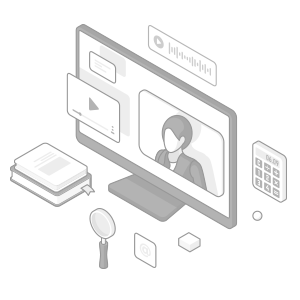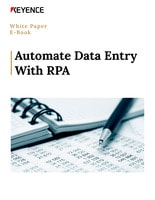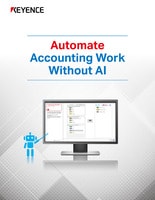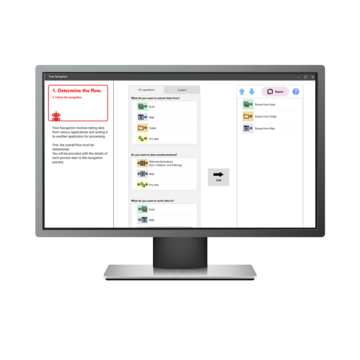RPA (Robotic Process Automation)
RPA for Finance and Accounting

Finance and accounting teams are under constant pressure to close books faster, reduce errors, and meet compliance requirements—all while doing more with fewer resources. Robotic Process Automation (RPA) enables finance professionals to automate time-consuming, manual tasks so they can focus on analysis, strategy, and decision-making.
RPA can automate a wide range of processes in finance and accounting, driving efficiencies and enabling faster, more accurate outcomes. By reducing reliance on manual tasks, it allows your team to focus on high-value activities that require strategic insight. Best of all, RPA requires no coding—business users can set up automations themselves.
Discover more about this product.
Click here to book your demo.

Common Use Cases for RPA in Finance
Invoice Processing
Invoice processing is often one of the most time-consuming and error-prone tasks for finance teams. RPA automates the extraction of data from invoices, matching them to purchase orders, and entering them into your accounting system without human intervention. This automation not only speeds up the process but also ensures that no data is missed or incorrectly entered, reducing costly errors.
Bank Reconciliation
Manual reconciliation of bank statements with internal records is tedious, especially when dealing with large volumes of transactions. RPA scenarios can automate the reconciliation process by logging into bank portals, pulling transaction data, and automatically matching them with your internal records, ensuring balances align. This reduces human error and saves hours of valuable time each month.
Financial Reporting
Generating recurring financial reports often involves pulling data from various sources, applying templates, and formatting data. RPA streamlines this process by gathering the necessary data, generating reports, and sending them to relevant stakeholders—automatically. The result is faster reporting cycles, more accurate reports, and reduced manual work for your team.
Accounts Payable and Receivable
Automate the movement of accounts payable (AP) and accounts receivable (AR) data across your ERP, billing platforms, and spreadsheets. RPA can track payments, set up reminders for overdue payments, trigger approval workflows, and update payment statuses—all with little human intervention.
Audit Preparation
Preparing for audits can take weeks as financial teams gather documentation and compile transaction records. With RPA, you can automatically compile an audit trail by extracting transaction data, organizing it into reports, and creating logs. All documents are neatly archived for easy retrieval when needed, drastically reducing preparation time.
Benefits for Finance Teams
- Faster Month-End Close: By automating time-consuming tasks like reconciliation and reporting, you can close the books faster and more accurately, freeing up time for deeper financial analysis.
- Higher Accuracy in Transaction Processing: RPA ensures that data entry and financial transactions are processed with 100% consistency, reducing errors and the risk of compliance issues.
- Better Visibility and Compliance: RPA helps ensure that processes are standardized, providing a clear audit trail and making it easier to meet regulatory requirements.
- Improved Employee Satisfaction: Finance teams can focus on higher-value tasks instead of repetitive manual work, improving job satisfaction and productivity.
- Scalable Processes Without Hiring More Staff: As your company grows, you can scale your finance processes without the need for additional hires—RPA is designed to handle increased workloads effortlessly.
Designed for Business Users
Unlike traditional automation tools that require scripting or IT involvement, our platform is no-code and intuitive. Finance professionals can build and manage their own automations using drag-and-drop logic and built-in recording features. Whether you’re automating simple tasks or complex workflows, you can do it without writing a single line of code.
Who Benefits Most?
KEYENCE’s RPA solution works seamlessly with the financial systems and applications you already use, without the need for custom APIs or additional IT support. Immediate results can be seen by:
- Corporate Accounting Teams: Streamline reconciliations, journal entries, and close activities
- Controllers & CFOs: Get faster access to reports and insights
- Accounts Payable/Receivable Specialists: Reduce data entry and automate communications
Modern accounting & finance professionals are choosing automation not just to save time—but to transform how they operate. RPA gives your team the freedom to focus on strategy instead of spreadsheets. By automating manual workflows, your department can achieve greater accuracy, speed, and compliance—without increasing headcount.
FAQs
How Does RPA Work in Finance and Accounting?
RPA automates repetitive tasks such as invoice processing, bank reconciliation, and financial reporting. It can automatically extract, process, and input data from various systems, reducing human error and increasing efficiency. These tasks can be set up by business users without the need for IT resources.
What Are the Benefits of Using RPA in Finance?
The main benefits include faster processing times, fewer errors, better compliance, and increased employee satisfaction. With RPA, finance teams can eliminate manual tasks, which leads to faster month-end closes, improved reporting accuracy, and the ability to scale processes without adding headcount.
We’re here to provide you with more details.
Reach out today!





